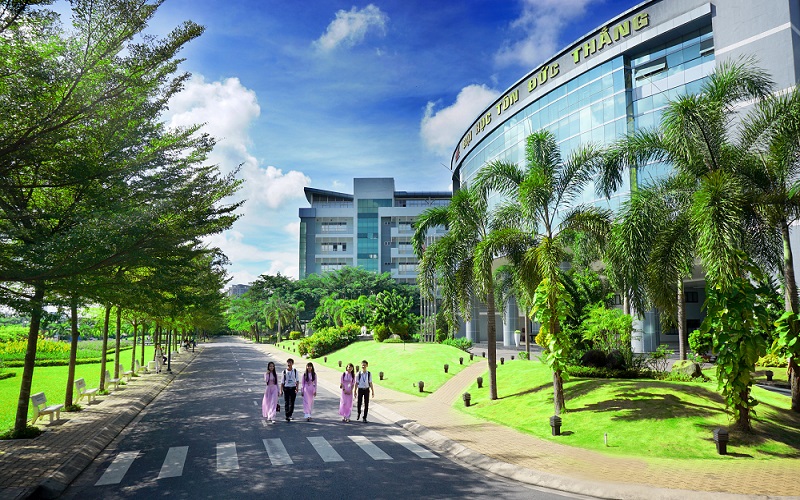Program of Transportation Engineering
1. Name of program: Transportation Engineering
2. Programme code : 7580205
3. Training degree: Engineering
4. Mode of study: Regular
5. Training time: 4 years
6. Programme objectives:
a. Graduates have sufficient knowledge of (1) economic-social science; (2) technical science; (3) basic and specific of Transportation engineering both in theory and in implementation; fully aware of the importance of a professional engineer in the modern working environment.
b. Graduates have specialized and advanced knowledge to apply their knowledge to analysis, design, formulation of construction methods, effective leadership and management in the field of Transportation Engineering.
c. Graduates have professional skills and soft skills to become the core staff in the construction field to meet the needs of integration and internationalization.
d. Graduates have knowledge in design and analysis to be able to perform reinforced concrete structure projects, steel structure projects, foundation projects, bridge design project, road design project, bridge construction project, road construction project.
e. Graduates have a sense of learning, improve knowledge in the spirit of lifelong learning, have independent creative thinking, have moral qualities to contribute to the development of the country
7. Expected learning outcomes:
a. Apply general natural science knowledge such as mathematics, physics for studying, researching and working in the field of Transportation Engineering.
b. Apply systematically the basic knowledges of political theory and career orientation for studying, researching, and working in the field of Transportation Engineering.
c. Use English efficiently with ELTS 5.0 or equivalent, use Microsoft Office proficiently with MOS 750
d. Apply effectively the fundamental knowledges of conctruction materials, geology engineering, geodetic, structural mechanics, and strength of materials. Select suitable designs and appropriate materials for Transportation structures.
g. Evaluate geological reports for calculating and designing foundation of Transportation structures.
h. Design concrete and steel structures of bridge; flexible and rigid pavement
i. Propose construction methods and manage construction progress.
j. Apply effectively specialized software to establish design drawings.
k. Supervise and estimate projects based on the understanding of rules, laws, and professional requirements.
l. Apply communication, teamwork, and negotiation skills effectively; manage writing and presentation time in design consultancy, supervision, and construction works.
m. Display the spirit of honesty and responsibility; abide by safety rule and professional ethics of engineers.
8. Teaching plan
9. Special features
a. The programme duration is 4 years, divided into 8 semesters. In the first year, students take the courses on general knowledge as well as some fundamental courses of the major. This creates a chance for the students to get familiar with their major from the beginning to foster their passion for their selected career.
b. Starting from the third semester, students focus on the specialized courses of the major, from fundamental knowledge to advanced knowledge. Approximately one third of these courses are practical and experimental ones. In addition, at the end of the 5th semester, students must enroll in the internship courses.
c. Infrastructure and facilities: The teaching activities of the programme are organized at the main campus of TDTU, which is equipped with the modern facilities and equipment to support advanced teaching methodologies.
d. The academic staff:
- All academic staff are Professors, Associate/Assistant Professors, and lecturers who have great reputation and teaching experience. Almost all lecturers got the PhD degree or pursuing PhD degree.
- For the courses and advanced topics that are highly practical, the Faculty plans to invite the experts from industrial companies, research institutes, non-govermental organization, etc. to give lectures and share the experience to the students.Curriculum: the curriculum is developed by the Faculty scientific and training committee (FSTC) and then approved by the President of TDTU. The curriculum can only be modified if there is a proposal from FSTC and again approved by the President of TDTU.
e. The critical knowledge and skills required by the TOP 100 universities worldwide are considered to be characterized in the programme. They include the following: (1) good practical and applied knowledge, significantly improving the internship activities at companies; (2) necessary soft skills such as teamwork, critical thinking, communication skill, and planning skills, to help the students to be able to work in the worldwide environment, (3) modern teaching methods which consider students as the center of the studying and teaching activities; (4) flexibility and convenience to transfer or exchange to other international programs as the same level or higher levels.
f. The programme is regularly reviewed and evaluated according to the “Procedure to evaluate the curricula offered by TDTU” , based on the feedbacks from the students, lecturers, alumni, and employers, experts in the field, and the accreditation organizations in the world.
10. Job opportunities
Students who graduate with the Bachelor degree in Transportation Engineering can find their jobs in the following positions:
a. Governmental organizations: including research centers; Institutes, Ministry of construction or Department of construction of local authorities.
Private companies and corporations, foreign companies: there are a lot of private companies working on Transportation and Infrastructure engineering field. Their main purposes include Consulting, Site construction manager, Designing, and Maintaining infrastructures.
b. Other opportunities: students who graduate from Transportation Engineering field can work in the companies in related fields such as Civil materials, Building for construction, Maintaining buildings, Real estate business etc…
10. Course syllabus:
Course syllabus:

